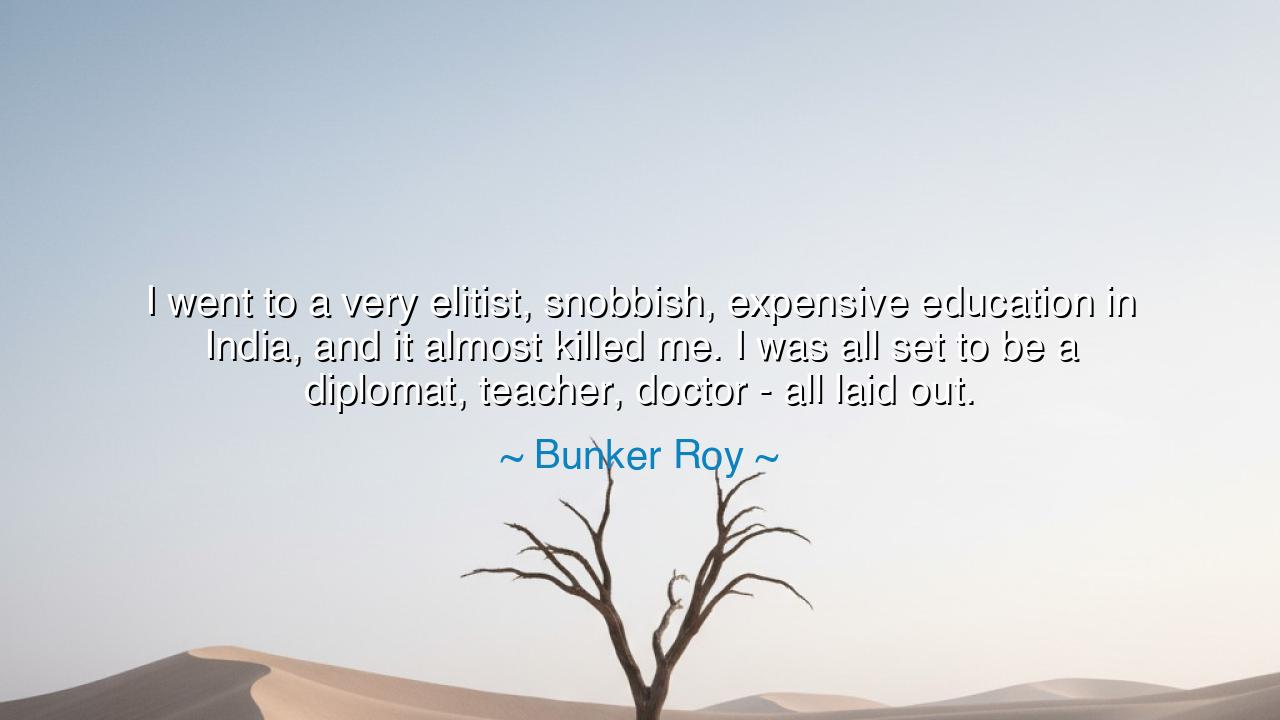
I went to a very elitist, snobbish, expensive education in
I went to a very elitist, snobbish, expensive education in India, and it almost killed me. I was all set to be a diplomat, teacher, doctor - all laid out.






The Indian social activist Bunker Roy, founder of the famed Barefoot College, once reflected with piercing honesty: “I went to a very elitist, snobbish, expensive education in India, and it almost killed me. I was all set to be a diplomat, teacher, doctor – all laid out.” In this confession lies a profound truth about the nature of education, the dangers of rigid systems, and the courage it takes to step away from paths imposed by privilege. His words speak not only of his own struggle, but of a universal tension: between what society dictates we must become, and what the soul quietly longs to be.
The elitist education Roy endured was designed to polish young men into servants of power—diplomats, teachers, doctors, all chosen by prestige rather than by calling. It was “all laid out,” like a path carved in stone, leaving little room for imagination or rebellion. Yet in this very rigidity lay its poison. For when education ceases to awaken the spirit and becomes merely a machine of ambition, it suffocates the soul. No wonder Roy said it “almost killed” him; the cage of privilege can be as deadly as the chains of poverty.
But instead of surrendering to despair, Roy turned his wound into vision. Rejecting the life of polished halls and international titles, he walked into the villages of India, where poverty spoke more honestly than the speeches of diplomats. There, among the poor and the forgotten, he founded Barefoot College, a place where illiterate villagers became engineers, teachers, and doctors for their own communities. It was here that women who had never seen a classroom became solar engineers, bringing light to their villages. It was here that learning became not a performance for the elite, but a tool for survival, dignity, and liberation.
This turning is reminiscent of Mahatma Gandhi, who also received an elite education in England, training to be a lawyer in the courts of empire. Yet Gandhi, too, abandoned the lure of prestige and returned to India to walk barefoot among the masses. He chose not the path of ambition, but the path of truth. In both Gandhi and Bunker Roy we see the same heroic pattern: the rejection of snobbish education that kills, in favor of an education rooted in life, service, and humility.
The lesson is clear: not all that glitters is gold. The world often praises the expensive path, the prestigious school, the career “all laid out.” But the soul must ask: is this my calling, or is this the world’s chain upon me? To mistake privilege for purpose is to lose oneself. Yet to dare to break from it, to seek wisdom in humility and service, is to find life abundant and free. True education is not found in gilded halls, but wherever truth is lived, wherever knowledge uplifts the forgotten and strengthens the weak.
What, then, shall we do? Let parents and teachers not force upon the young the burden of elitist expectation, but rather cultivate the spark of vocation within them. Let students remember that their worth is not measured by the price of their schooling, but by the depth of their contribution to the world. And let us each examine the path we walk: is it “all laid out” by others, or is it chosen by the whisper of our own spirit?
In practical steps, we can honor Roy’s wisdom by seeking useful learning, not just prestigious learning. Read to serve, not just to boast. Train your hands as well as your mind. Honor those who teach life by living it, even if they bear no diplomas. And above all, be willing to step off the path of vanity and onto the road of meaning.
Thus Bunker Roy’s words endure, not as bitterness but as warning and inspiration. He shows us that an elitist education may polish the mind but corrode the soul, while an education rooted in life can lift nations. To the generations that follow, the call is this: do not be enslaved by the world’s definition of success. Seek instead to be alive, to be useful, to be free. And in that freedom, you will not only find yourself—you will become a light to others.






AAdministratorAdministrator
Welcome, honored guests. Please leave a comment, we will respond soon